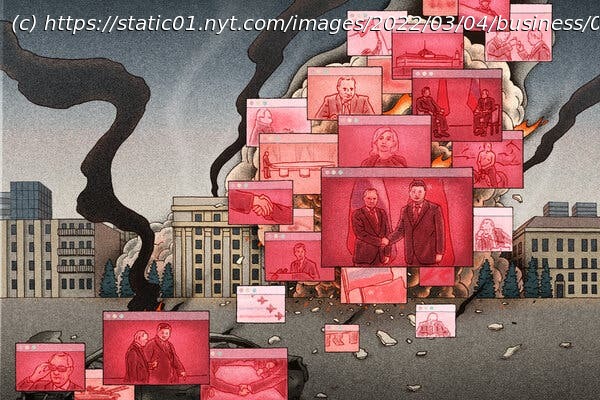In much of the world, Russia is losing the information war over Ukraine. In China, though, it’s winning big.
Hours after Russia invaded Ukraine on Feb.24, the Chinese Communist Party tabloid, Global Times, posted a video saying that a large number of Ukrainian soldiers had laid down their arms. Its source: the Russian state-controlled television network, RT. Two days later, China’s state broadcaster Central Television Station (CCTV) flashed a breaking news alert, quoting Russia’s parliamentary speaker, that President Volodymyr Zelensky of Ukraine had fled Kyiv. CCTV then created a related hashtag on the Twitter-like platform Weibo that was viewed 510 million times and used by 163 media outlets in the country. On Feb.28, as Russia became an international pariah, the Russian state-owned news agency Sputnik shared a message of strength with its 11 million Weibo followers. The Russian foreign ministry spokeswoman, Sputnik said, said Russia still had friends in the world, especially “a real giant” like China. “Add oil, Russia,” Sputnik’s Weibo follower @fengyiqing cheered on, using a Chinese expression of support. “All the people in the world who love justice are friends of Russia.” As European and American officials press Facebook, Twitter, TikTok and other online platforms to clamp down on Russian disinformation, China has embraced Russia’s propaganda and lies about the war. China’s state-owned media outlets quoted their Russian counterparts’s coverage without verification, helping to magnify their disinformation on the Chinese internet. They put Russian officials on state television networks with little pushback on their claims. When it comes to information, the Chinese government is a control freak, dictating and censoring what its 1.4 billion people consume. Beijing has silenced and jailed its critics and journalists. It has coerced and co-opted the biggest Chinese online platforms to enforce its censorship guidelines. It blocks nearly all major western news and information websites, including Google, Twitter, YouTube, Wikipedia, The New York Times, The Wall Street Journal and the BBC. Yet as the world faces one of its most serious geopolitical crises since the end of the Cold War, China let down its digital defenses and allowed Kremlin’s propaganda machine to help shape public perception of the war. No wonder the Chinese internet is overwhelmingly pro-Russia, pro-war and pro-Putin. If China wants to remain officially ambiguous about whether it supports Vladimir V. Putin’s war — refusing to call it an invasion and abstaining from a U.N. vote to condemn the invasion — its state-controlled media nonetheless makes very clear where China stands. The China-Russia information alliance is forged over a shared worldview of two leaders, Xi Jinping and Vladimir V. Putin, who, out of deep distrust of the United States, are determined to challenge the West’s dominance in the competition for public opinion.






